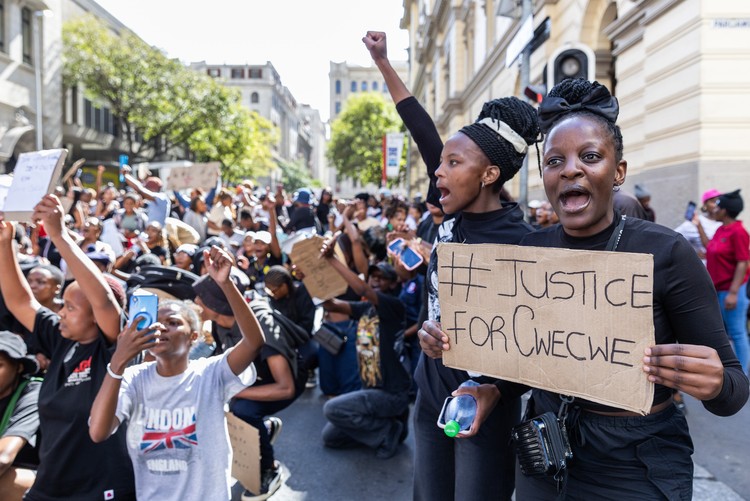
20 May 2025
Protesters in Cape Town on 1 April calling for justice for Cwecwe. Doubts have been raised about whether Cwecwe was raped. Archive photo: Ashraf Hendricks
The National Prosecuting Authority (NPA) has confirmed that it decided not to prosecute a case of rape of a seven-year-old-girl in Matatiele, Eastern Cape, after finding no “conclusive evidence” that the incident took place.
The alleged incident took place in October 2024. The police presented a docket to the NPA for prosecution in November. But after reviewing the docket, the NPA decided not to prosecute the case.
“The prosecutors assessed the contents thereof and concluded that there was insufficient evidence upon which a successful prosecution could be instituted, as no conclusive evidence of rape/sexual assault could be found after an interview and examination conducted on the minor girl,” NPA spokesperson Mthunzi Mhaga said in a statement on 17 May.
After public outcry in recent months, during which the girl became known as Cwecwe, the police assigned head of the Family Violence, Child Protection and Sexual Investigations Unit, Major General Mmantsheke Lekhele, to oversee the investigation into the rape. The NPA has confirmed that a docket has now been resubmitted by the police for reconsideration.
GroundUp first reported on the alleged rape in December, two months after the incident allegedly took place.
Cwecwe’s mother had told GroundUp that her daughter was raped in October at Bergview College in Matatiele. She had noticed her daughter was acting strangely the next day and was in pain, she said.
She then took Cwecwe to a private doctor, who found that the girl had been raped. GroundUp was shown a copy of the doctor’s report which confirmed the rape. We had little reason to question the veracity of the report at the time.
The rape was immediately reported to the police, the mother said, but two months later there was no progress in the investigation. At the time, the police told GroundUp the delays were due to a lack of resources and that the case was very sensitive given the age of the victim.
The police did not inform GroundUp at the time that investigation had failed to provide sufficient evidence that Cwecwe was raped, or that the NPA had already decided not to prosecute the case.
Four months after our first article, on 1 April, several cities in South Africa erupted in protest. Days before, Cwecwe’s mother was interviewed on a podcast, where she alleged that three suspects had been identified by police including the principal of the school and a caretaker, with whom the mother alleged Cwecwe had spent time on the day of the incident. She also alleged that the principal had refused to have DNA samples taken.
This caused outrage on social media and the principal was widely identified by the public as the key suspect in the case. His face and name went viral. Police minister Senzo Mchunu added fuel to the fire by claiming in a statement that the principal was a suspect. Once again, there was no indication of the NPA’s decision not to prosecute the case.
By this time, Afriforum’s legal team was representing the principal. Afriforum clarified that the principal had not been identified as a suspect. This was later conceded by the police.
In response to the protests, the police assigned top cop Lekhele to the case. The police investigation appeared to start fresh. But when the police tried to interview Cwecwe, they hit a brick wall.
Cwecwe’s mother had refused the police access to the girl, the police told Parliament in April. A forensic social worker, who would provide psychosocial support and also gather evidence, had also not been allowed to talk to Cwecwe. The police also said there was no foreign DNA found on Cwecwe’s clothes.
Cwecwe’s mother told GroundUp at the time that Cwecwe is not well and that she had asked the social worker to wait until she is feeling better.
Afriforum, which now represents both the principal and the caretaker, said in a statement on Saturday: “Our assessment of the facts worryingly suggests as the only reasonable inference that the authorities have allowed themselves to be intimidated by nameless and faceless keyboard warriors into investigating a case, despite there being no conclusive evidence of rape or sexual assault included in the docket after examination of the victim. This led to innocent people being convicted in the court of public opinion.”